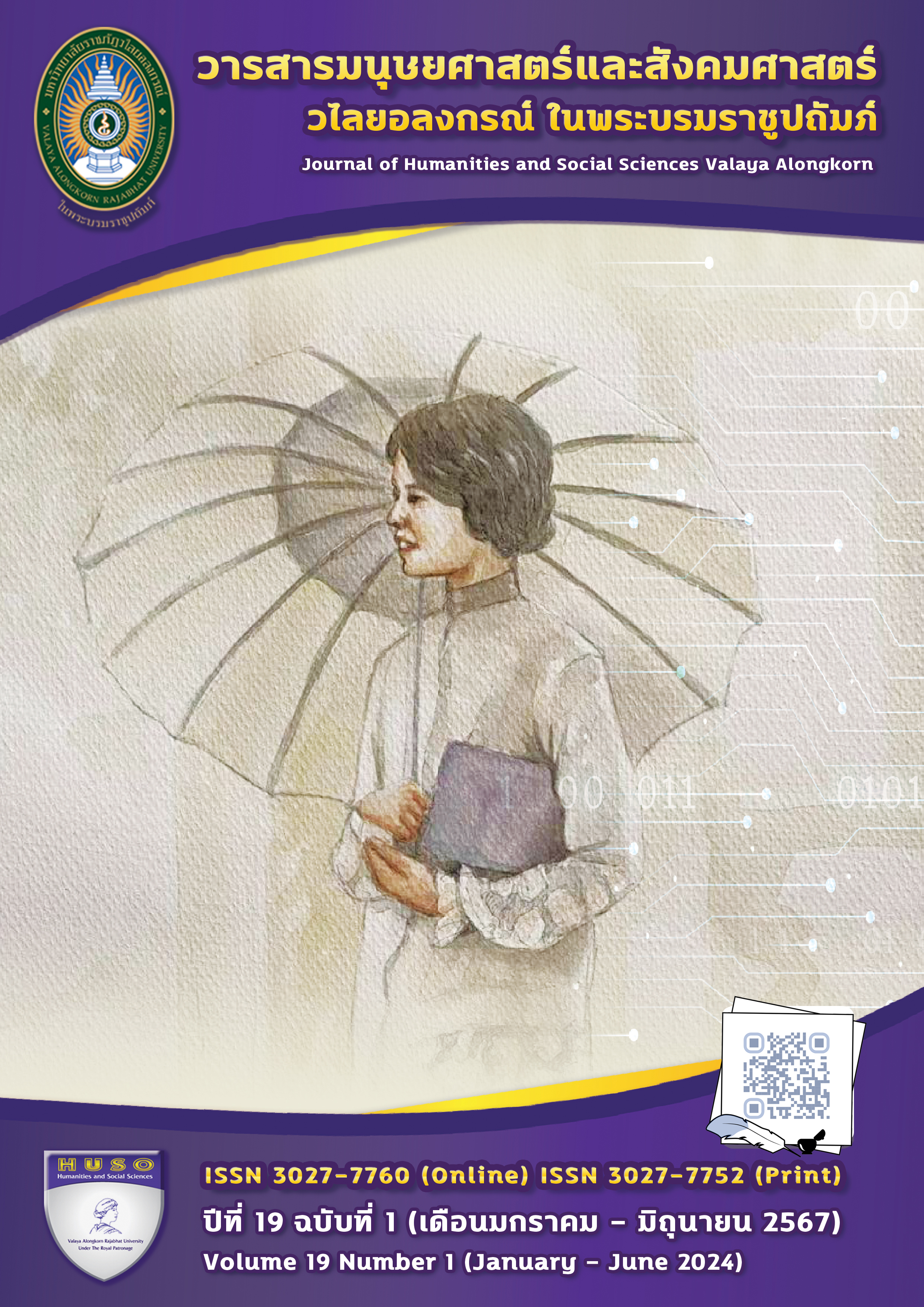A MODEL OF SERVICE QUALITY, DIGITAL TRANSFORMATION, STRATEGY MANAGEMENT, ORGANIZATIONAL INNOVATION, BUSINESS PERFORMANCE
Main Article Content
Abstract
This article aims to present insights from a literature review on the factors and outcomes of being an innovative organization in the small hotel business sector in Thailand.
It seeks to explain the meaning and components, as well as the relationships among related variables. From the literature review, it is evident that popular variables studied include service quality, organizational innovation, and business performance of small hotels in Thailand. Summarizing the literature, it can be concluded that being an innovative organization in the small hotel business sector in Thailand comprises five key components: service quality, digital transformation, strategic management, organizational innovation, and business performance, including the reflective relationships indicated by empirical studies. These findings suggest that implementing these aspects effectively leads to improved business operations, resulting in positive outcomes for business performance, both financially and non-financially.
Article Details

This work is licensed under a Creative Commons Attribution-NonCommercial-NoDerivatives 4.0 International License.
ลิขสิทธิ์บทความวิจัยที่ได้รับการตีพิมพ์เผยแพร่ในวารสารมนุษยศาสตร์และสังคมศาสตร์ วไลยอลงกรณ์ ในพระบรมราชูปถัมภ์ ถือเป็นกรรมสิทธิ์ของคณะมนุษยศาสตร์และสังคมศาสตร์ มหาวิทยาลัยราชภัฏวไลยอลงกรณ์ ในพระบรมราชูปถัมภ์ ห้ามนำข้อความทั้งหมดหรือบางส่วนไปพิมพ์ซ้ำ เว้นแต่จะได้รับอนุญาตจากมหาวิทยาลัยเป็นลายลักษณ์อักษร
ความรับผิดชอบ เนื้อหาต้นฉบับที่ปรากฏในวารสารมนุษยศาสตร์และสังคมศาสตร์ วไลยอลงกรณ์ ในพระบรมราชูปถัมภ์ เป็นความรับผิดชอบของผู้นิพนธ์บทความหรือผู้เขียนเอง ทั้งนี้ไม่รวมความผิดพลาดอันเกิดจากเทคนิคการพิมพ์
References
Al Sawalqa. (2011). Balanced Scorecard implementation in Jordan: An initial analysis. International Journal of Electronic Business Management, 9(3), 196.
Bakator, M. (2018). Developing a model for improving business and competitiveness of domestic enterprises. Journal of Engineering Management and Competitiveness (JEMC), 9(2), 87-96.
Bellini, N. (2023). Reluctant innovators: Dynamic capabilities and digital transformation of Italian opera houses in the pandemic crisis. Administrative Sciences, 13(3), 83.
Chen, L. (2022). Perception of organizational politics and innovative behavior in the workplace: The roles of knowledge-sharing hostility and mindfulness. Journal of Business Research, 145, 268-276.
Chu, J. C. (2023). A study on how workforce diversity affects business management strategies. International Journal of Organizational Innovation (Online), 15(3), 100-108.
Crosman, P. (2018). How artificial intelligence is reshaping jobs in banking. American Banker, 183(88), 1.
Edward, E. (2023). Open source corporate governance in the era of digital transformation. Research Handbook on Digital Strategy, 309.
Eric Gonu, E. M. (2023). Customer orientation, service quality and customer satisfaction interplay in the banking sector: An emerging market perspective. Cogent Business & Management, 10(1), 2163797.
Garg, J. (2023). The use of digital healthcare systems to predict diseases. Asia Pacific Journal of Health Management, 18(1), 267-274.
Georgescu, A. (2022). Associative and non-associative business structures: A literature review for the identification of business development opportunities for SME in the digital age. In Marketing and Smart Technologies: Proceedings of ICMarkTech 2021(2), 337-348.
Gordon, J. R., & Associates. (1990). Soviet military doctrine and strategy shifts: Principal dynamics and implications for conventional warfare (Volumes I-III). The Ohio State University.
Hair, J., Black, W., Babin, B., Anderson, R. and Tatham, R. (2006) Multivariate data analysis. 6th Edition, Pearson Prentice Hall, Upper Saddle River.
Jin, M., & Kim, B. (2022). The effects of ESG activity recognition of corporate employees on job performance: The case of South Korea. Journal of Risk and Financial Management, 15(7), 316.
Kondratenko, N. (2023). Theoretical and analytical substantiation of the factors affecting the level of service quality management of railway transport enterprises. Financial & Credit Activity: Problems of Theory & Practice, 2(49).
Kotane, I. (2022). Business performance evaluation practice in manufacturing sector in Latvia. Ekonomika, 101(1), 20-36.
Lawande, N. (2023). 'Build the golf course first'–An organisational and strategic management perspective on UK defence reviews. Defence Studies, 1-21.
Loonam, J., Eaves, S., Kumar, V., & Parry, G. (2018). Towards digital transformation: Lessons learned from traditional organizations. Strategic Change, 27(2), 101-109.
Mićić, L. (2022). Digital transformation and its influence on GDP. Economics-Innovative and Economics Research Journal, 5(2), 135-147.
Millet, J. D. (1954). Management in the Public Service: The Quest for Effective Performance. McGraw-Hill.
Mutuku, A. K. (2022). Effect of entrepreneurial skills on organizational performance of small and medium enterprises in Nakuru City-Kenya. International Journal of Economics & Business Administration (IJEBA), 10(3), 156-173.
Panigrahi, S. (2023). Lean manufacturing practices for operational and business performance: A PLS-SEM modeling analysis. International Journal of Engineering Business Management, 15, 18479790221147864.
Pawlowska, E. (2021). Corporate social responsibility of water and sanitation company in the Czech Republic-Case study. Energies, 14(13), 3981.
Phan, D. T. (2022). Impact of income diversification on the business performance of Vietnamese commercial banks.
Pollock, N. L. (2023). The valorising pitch: How digital start‐ups leverage intermediary coverage. Journal of Management Studies, 60(2), 346-371.
Renzl, B. (2021). Organizational agility: Current challenges and future opportunities. Journal of Competences, Strategy & Management, 11, 1-10.
Simangunsong, E. (2023). Analysis of exhibition service quality dimensions: A case in Indonesia. Jurnal Aplikasi Bisnis dan Manajemen (JABM), 9(1), 70-70.
Syariati, A. (2023). Innovation norms during COVID-19 and Indonesian hotel performance: Innovative energy use as a mediating variable. Cogent Business & Management, 10(1), 2194119.
Tourani, N. (2022). Thriving in a shifting landscape: Role of social media in support of business strategy. Asia Pacific Management Review, 27(4), 276-281.
Vysochan, O. (2023). Trendy raportowania zrównoważonego rozwoju: Systematyczna analiza sieciowa literatury. Comparative Economic Research, 26(2), 7.
Wheeler, A. (2022). Exploring China's Digital Silk Road. In The Digital Transformation of Logistics: Demystifying Impacts of the Fourth Industrial Revolution (pp. 185-196).
Yang, C. C. (2020). The effectiveness analysis of the practices in five quality management stages for SMEs. Total Quality Management & Business Excellence, 31(9-10), 955-977.


